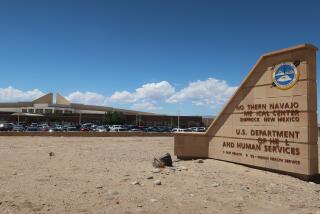INDIAN COUNTRY TODAY : Tribal Backing of Elder Health Care Is Lacking
- Share via
“Dedicated to Our Elders and to Our Children” reads the first page of the nicely bound report of the National Indian Summit to Health-Care Reform. The sentiment is a noble one, and it plays well to the American public’s popular perception that all Indian tribes hold elders in the highest esteem.
Inside the report, however, which represents Indian country’s official statement on health-care reform, only scattered references can be found to elder health in addition to the National Indian Council on Aging’s position paper.
“The only time we hear from our tribal council is when they’re running for office,” several elders told us. “When I looked at our tribal budget and saw how few dollars are spent on elder programs, I was shocked,” said another.
If as is true in most tribes, more than 8% of the population is elderly, is a corresponding percentage of tribal funds being committed to programs for them? Elders need your support--not just through words, but through your actions. As tribal leaders, you have the responsibility to lead the way. NICOA is committed to changing the current Indian Health Service non-policy about long-term care. We also see that most tribes are not submitting testimony or requesting funding, not talking to their congressional representatives, not expressing long-term care needs to the Indian Health Service. NICOA is becoming increasingly convinced that community--and home-based long-term care--will never happen in Indian country until tribal leaders say that it will.
More to Read
Sign up for Essential California
The most important California stories and recommendations in your inbox every morning.
You may occasionally receive promotional content from the Los Angeles Times.












